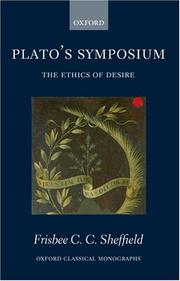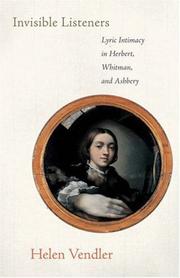| Listing 1 - 10 of 19 | << page >> |
Sort by
|
Book
ISBN: 9789020983692 Year: 2009 Publisher: Tielt Lannoo
Abstract | Keywords | Export | Availability | Bookmark
 Loading...
Loading...Choose an application
- Reference Manager
- EndNote
- RefWorks (Direct export to RefWorks)
Book
ISBN: 9782738123114 Year: 2009 Publisher: Paris : O. Jacob,
Abstract | Keywords | Export | Availability | Bookmark
 Loading...
Loading...Choose an application
- Reference Manager
- EndNote
- RefWorks (Direct export to RefWorks)
Intimacy (Psychology) --- Couples --- Intimité --- Psychological aspects
Book
ISBN: 9780230579569 Year: 2009 Publisher: New York Palgrave Macmillan
Abstract | Keywords | Export | Availability | Bookmark
 Loading...
Loading...Choose an application
- Reference Manager
- EndNote
- RefWorks (Direct export to RefWorks)
Control (Psychology) --- Interpersonal relations --- Intimacy (Psychology)
Book
ISBN: 1282036041 9786612036040 1443803820 9781443803823 9781443801188 1443801186 9781282036048 1443801186 Year: 2009 Publisher: Newcastle upon Tyne, U.K. : Cambridge Scholars Pub.,
Abstract | Keywords | Export | Availability | Bookmark
 Loading...
Loading...Choose an application
- Reference Manager
- EndNote
- RefWorks (Direct export to RefWorks)
The Possibility of Love is an exploration of a concept close to the human heart. Grounded in the ordinary, everyday experiences of human living, the book provides an exploration of the diverse obstacles to the experience of love, the consequences of love's absence, and the unquenchable desire for love which propels, influences and ultimately motivates much of human behaviour. The Possibility of Love poses the question: is love actually possible between human beings, or is it an ideal, a fa...
Love. --- Affection --- Emotions --- First loves --- Friendship --- Intimacy (Psychology)
Book
ISBN: 9782296107915 2296107915 Year: 2009 Publisher: Paris Harmattan
Abstract | Keywords | Export | Availability | Bookmark
 Loading...
Loading...Choose an application
- Reference Manager
- EndNote
- RefWorks (Direct export to RefWorks)
Psychological study of literature --- Intimacy (Psychology) in literature. --- French literature --- Intimacy (Psychology) --- Intimacy (Psychology) in literature --- Emotions --- Interpersonal relations --- Love --- History and criticism --- France --- Social life and customs. --- Thematology --- History and criticism. --- Literary studies
Book
ISBN: 0674042611 9780674042612 Year: 2009 Publisher: Cambridge, MA
Abstract | Keywords | Export | Availability | Bookmark
 Loading...
Loading...Choose an application
- Reference Manager
- EndNote
- RefWorks (Direct export to RefWorks)
Ranging from Plato to writers as diverse as Shakespeare, Proust, Forster, Beckett, Huxley, Lawrence, and Larkin, Reeve brings the vast resources of Western literature and philosophy to bear on the question of love. Looking at love in light of the classical world and Christianity, and in its complex relationship with pornography, violence, sadomasochism, fantasy, sentimentality, and jealousy, Reeve invites us to think more broadly about love, and to find the confusions that inevitably result to be creative rather than disturbing.
Love. --- Life. --- Life --- Affection --- Emotions --- First loves --- Friendship --- Intimacy (Psychology) --- Philosophy

ISBN: 9780199567812 9780199286775 0199286779 0191713198 0199567816 9786611154301 0191536822 128115430X 143561898X Year: 2009 Publisher: Oxford Oxford University Press
Abstract | Keywords | Export | Availability | Bookmark
 Loading...
Loading...Choose an application
- Reference Manager
- EndNote
- RefWorks (Direct export to RefWorks)
Frisbee Sheffield argues that the Symposium has been unduly marginalized by philosophers. Although the topic, eros, and the setting at a symposium have seemed anomalous, she demonstrates that both are intimately related to Plato's preoccupation with the nature of the good life, with virtue, and how it is acquired and transmitted. For Plato, analyzing our desires is a way of reflecting on the kind of people we will turn out to be and on our chances of leading a worthwhile and happy life. In its focus on the question why he considered desires to be amenable to this type of reflection, this book explores Plato's ethics of desire.
Plato --- Ethics, Ancient. --- Love. --- Plato. --- Morale ancienne --- Amour --- Ethics [Ancient ] --- Love --- Ethics, Ancient --- Affection --- Emotions --- First loves --- Friendship --- Intimacy (Psychology) --- Ancient ethics
Book
ISBN: 9781433107818 Year: 2009 Publisher: New York : P. Lang,
Abstract | Keywords | Export | Availability | Bookmark
 Loading...
Loading...Choose an application
- Reference Manager
- EndNote
- RefWorks (Direct export to RefWorks)
Sexual abstinence --- Intimacy (Psychology) --- Christian ethics. --- Sexual ethics. --- Continence --- Intimité --- Morale chrétienne --- Morale sexuelle --- Religious aspects --- Christianity. --- Religious aspects --- Christianity. --- Aspect religieux --- Christianisme --- Aspect religieux --- Christianisme
Book
ISBN: 9782081233010 2081233010 Year: 2009 Publisher: Paris Flammarion
Abstract | Keywords | Export | Availability | Bookmark
 Loading...
Loading...Choose an application
- Reference Manager
- EndNote
- RefWorks (Direct export to RefWorks)
Philosophical anthropology --- Love --- Amour --- Philosophy --- Philosophie --- Badiou, Alain --- Literature - Philosophy - Essay On Love - Interview --- 177.61 --- Affection --- Emotions --- First loves --- Friendship --- Intimacy (Psychology) --- Liefde. Genegenheid --- 177.61 Liefde. Genegenheid --- Badiou, A. --- Badiu, Alen, --- Badiou, Alan, --- Bādiyū, Ālān, --- Бадиу, Ален, --- باديو, آلان, --- באדיו, אלן, --- アラン・バディウ, --- 巴迪欧, 阿兰, --- Badiou, Alain - Interviews

ISBN: 0691116180 069113474X 1282086774 1400826713 9786612086779 9781400826711 9780691134741 9780691134741 9780691116181 Year: 2009 Publisher: Princeton, NJ
Abstract | Keywords | Export | Availability | Bookmark
 Loading...
Loading...Choose an application
- Reference Manager
- EndNote
- RefWorks (Direct export to RefWorks)
When a poet addresses a living person--whether friend or enemy, lover or sister--we recognize the expression of intimacy. But what impels poets to leap across time and space to speak to invisible listeners, seeking an ideal intimacy--George Herbert with God, Walt Whitman with a reader in the future, John Ashbery with the Renaissance painter Francesco Parmigianino? In Invisible Listeners, Helen Vendler argues that such poets must invent the language that will enact, on the page, an intimacy they lack in life. Through brilliantly insightful and gracefully written readings of these three great poets over three different centuries, Vendler maps out their relationships with their chosen listeners. For his part, Herbert revises the usual "vertical" address to God in favor of a "horizontal" one-addressing God as a friend. Whitman hovers in a sometimes erotic, sometimes quasi-religious language in conceiving the democratic camerado, who will, following Whitman's example, find his true self. And yet the camerado will be replaced, in Whitman's verse, by the ultimate invisible listener, Death. Ashbery, seeking a fellow artist who believes that art always distorts what it represents, finds he must travel to the remote past. In tones both tender and skeptical he addresses Parmigianino, whose extraordinary self-portrait in a convex mirror furnishes the poet with both a theory and a precedent for his own inventions. By creating the forms and speech of ideal intimacy, these poets set forth the possibility of a more complete and satisfactory human interchange--an ethics of relation that is uncoerced, understanding, and free.
American poetry --- Authors and readers --- God in literature. --- Intimacy (Psychology) in literature. --- Lyric poetry --- Reader-response criticism. --- History and criticism. --- Whitman, Walt, --- Herbert, George, --- Ashbery, John --- Criticism and interpretation. --- Ashbery, John, --- Reader-oriented criticism --- Reception aesthetics --- Readers and authors --- Harbert, George, --- Criticism --- Reading --- Authorship
| Listing 1 - 10 of 19 | << page >> |
Sort by
|

 Search
Search Feedback
Feedback About UniCat
About UniCat  Help
Help News
News